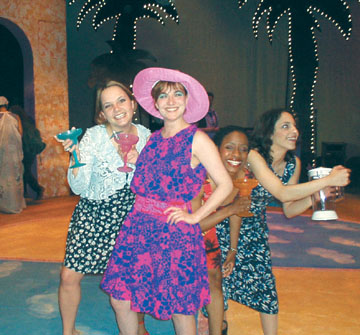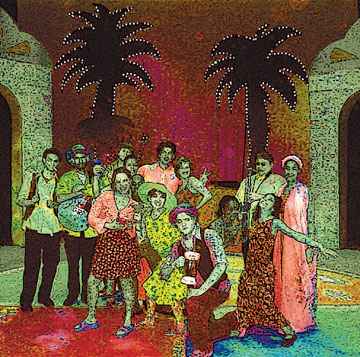The First Night of “Twelfth Night”

May 27, 2003
Ever imagined what Shakespeare would be like with conga lines, margaritas, and a live band? I couldn’t until I saw director John Conlon’s version of “Twelfth Night” on May 7. Fraught with mistaken identities, sword fights, and electric palm trees somewhere on the Caribbean island of “Illyria,” one could kick back and very well dream up such a scenario. However, it took talent to skillfully graft Elizabethan English and mannerisms onto a cast trying to maintain a “Point Break” kind of attitude in colorful Hawaiian shirts. In this play, “Some are born great, some achieve greatness, and some have greatness thrust upon them.”
“Twelfth Night,” one of the more well-known Shakespearean comedies starts off with young shipwreck survivor Viola (Jenna Raymond) dazed and confused in a strange land. However, she decides to become “Cesario” for the sake of safety and convenience and subsequently lands a job as a go-between on behalf of the local duke, Orsino (Jorge Fuentes) suing for the hand of Olivia (Amanda Kelly). Things start to get wacky when Olivia falls for “Cesario” while Viola, herself, is in love with Orsino.
To further complicate matters, Sebastian (Kurt Lusas), twin brother to Viola, washes ashore as well, only he and Viola assume one another to be dead. He is quickly attacked by Sir Toby Belch (Paul Norton), Olivia’s uncle, and the foppishly foolish Sir Andrew Aguecheek (Jonathan Carnes) a man with his own designs on Olivia and her fortune. Meanwhile, the latter two are involved in intrigues of their own with Maria (Elissa Jordan), servant to Olivia, and Feste (Heather Phillips), the singing clown to bring down their haughty fellow servant Malvolio (Rocky Graziano) with a forged letter implying she has eyes for no one else but him.
It’s confusing enough to follow, minus the flowery language, which passed for slang in Shakespeare’s day. Try being a man and playing a woman, playing a man since men acted all the parts in sixteenth-century England and you can see just how hysterical a play like this could be.
Sirs Andrew and Toby, as well as Maria, Feste, and Malvolio stole the show. “Cross-gartering,” a style of wearing stockings (imagine the ribbons of pointe shoes for a prima ballerina) isn’t all that funny in itself because the fashion largely disappeared with the ascendancy of the Stuarts, the post-Tudor royalty. However, instead of getting rid of that particular gag, important because that’s what Maria’s pseudo-love letter says she prefers in a man but not indispensable, Conlon keeps it allowing the actors to show their stuff in being able to carry off a centuries-old joke.
With the usual obscure but still oddly contemporary sexual double entendres, Andrew and Toby made a point of outrageously acting out some of the more colorful phrases, playing off each other with Andrew as the Keanu Reeves-like persona and Toby as the witty, obscene brain of the pair. Feste acts both as a lounge singer and hunter, leading the various cast members into a sensually, linguistically baited trap. Maria and Malvolio butt heads to the continuous amusement of the audience, first behaving as the queen of the party and the second as a pompous representative of the status quo.
This year has seen some innovative approaches to old favorites like the previous classic tragic romance, Romeo and Juliet, the slick tommy-gun- toting, spat clad, set in fascist Italy. The Theatre Department, now under the umbrella of the Performing Arts Department, has also seen the addition of Technical Director Laura Schrader to the faculty this year, has successfully ridden out the changes.












































































